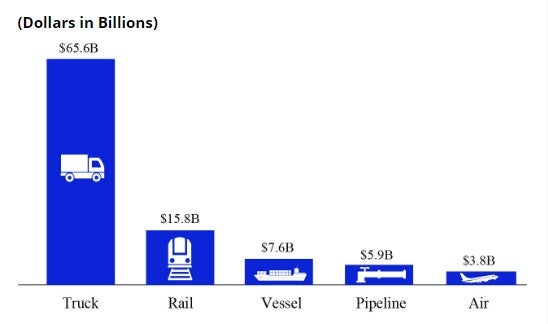U.S. Department of Agriculture Secretary Sonny Perdue joined seven of his predecessors at the agency in calling on Congress to vote on and ratify the United States-Mexico-Canada Agreement (USMCA), a trade deal with major implications for cross-border trucking.
The Sept. 18 letter to party leaders in the House in the House and Senate urging passage of the agreement noted that with Canada and Mexico being the top two export markets for U.S. agricultural products, “we believe USMCA makes positive improvements to one of our most critical trade deals.”
The letter was followed by a Sept. 19 press conference hosted by Perdue and three of the former agriculture secretaries, Republican John Block and Democrats Dan Glickman and Tom Vilsack.
“Support for USMCA crosses all political parties, specifically when it comes to the agriculture community, and I am proud to stand side by side with former agriculture secretaries who agree USMCA is good news for American farmers,” Perdue said.
While U.S. Trade Representative Robert Lighthizer, with the backing of President Donald Trump, has been able to renegotiate the North American Free Trade Agreement (NAFTA) to create the USMCA, a group of Democrats in Congress have yet to agree on its terms, citing issues with the agreement’s labor provisions. Some are concerned that Mexico won’t follow through on enforcing them, which could lead to U.S. companies closing factories and sending jobs to Mexico, which they maintain occurred following NAFTA.
“I voted for NAFTA in 1994, and at that time there were serious concerns raised about enforceability” from Mexico, Glickman said. Since then, he said, “there’s been a lot more focus on the operation of NAFTA and how it needs to be enhanced and improved in terms of enforcing the labor and other provisions. You can never totally predict enforcement, but at same time, the atmosphere is much better now for enforcement than when NAFTA was passed.”
U.S.-Canada and U.S.-Mexico cross-border freight totaled $103.8 billion in June, according to the latest government data. Truck and rail moved the majority of that cargo, at $65.6 billion and $15.8 billion, respectively.

With the trucking industry standing to gain or lose the most, USMCA was a hot topic at the country’s southern border during a recent meeting of the Laredo Motor Carriers Association. The agreement has significant implications for transportation companies involved in the northern-border agriculture sector as well, by creating new market access for U.S. exports to Canada of dairy, poultry and eggs. In exchange, the U.S. will provide new access to Canada for some dairy, peanut and sugar products, according to the agreement.
“The challenge is, if we don’t get this agreement through, we will still face a very closed market in Canada,” Vilsack said. “This agreement opens it up and is really important for dairy products.” U.S. Chamber of Commerce President Tom Donohue named ratifying the USMCA before the end of the year one of the three biggest issues that could determine whether the U.S. is able to avoid a recession, along with resolving trade issues with China and passing a long-term domestic infrastructure package.










